Preventing the Government-Funded Charity Sector Lobbying Government
This page was last edited on at
As of 2017, charities are only allowed to lobby government when this is in pursuit of their charitable purpose. There are further rules covering campaigning activity in the run-up to an election. Potential breaches are investigated by the Charity Commission.1
The IEA actively campaigned to influence charity law in the UK, which affected a number of charities working on public health topics.
Background

Tweet by Mark Littlewood from the IEA, February 2016. (Twitter)2
From 2012 until 2016, the Institute of Economic Affairs (IEA) led a campaign in the UK to prevent Government-funded charities from engaging, lobbying or generally influencing Government or Parliament.
In doing so the IEA has labelled charities as “sock puppets” and twisted the definition of what a “sock puppet” actually is (see the section below). The work has been led by the IEA’s “Head of Lifestyle Economics”, Christopher Snowdon.
Until 2016, there were no restrictions on the ways in which charities which were funded by the Government could themselves lobby the Government or politicians on a whole range of issues including counter extremism, ecology, animal welfare, and health. The proposed changes potentially undermined the effectiveness and outreach of a whole host of charities, many of which are partly or solely reliant on Government funding.
The IEA had paid particular attention to the funding and lobbying of health charities, which could be seen as especially pertinent as it has accepted tens of thousands of pounds from tobacco companies in recent years. For more information on its funding see:
The IEA, which refuses to disclose its own sources of funding, is seen as one of the least transparent think tanks in Europe about declaring its funding sources.3 However, it has been funded by tobacco companies. Its campaigning to undermine health charities can be seen as an example of Third Party Techniques.
In February 2016, the Conservative Government adopted a policy to restrict the ability of government-funded charities to lobby government.4 Dr Sarah Wollaston, the Conservative then-chairwoman of the Commons Health Select Committee (now Health and Social Care Committee),5 warned that the changes would have “serious consequences” for the public health sector where the balance is “already distorted in favour of industry”.6
Charities also collectively raised serious concerns and urged the Government to reconsider, as did academics who believed that the clause would also affect researchers and academics who receive Government funding (see below).
The IEA’s Campaign Attacking Charities as “Sock Puppets”
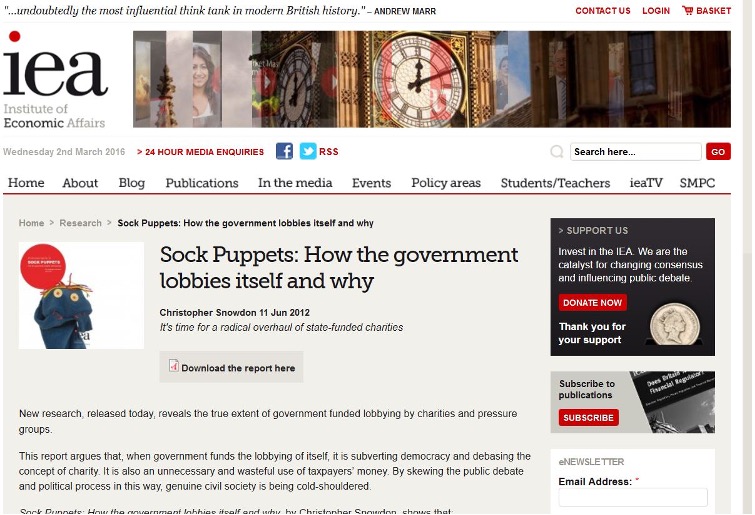
IEA’s first “Sock Puppet” report, published in 2012. (iea.org.uk)7
2012
In June 2012, the IEA published a report by Christopher Snowdon, entitled “Sock puppets – how the government lobbies itself and why”.7 The report gave greater prominence to the IEA’s public campaign against the state funding of charities, especially those working on health.
As Snowdon declared at the time: “It’s time for a radical overhaul of state-funded charities”.7
While Snowdon outlined how thousands of charities received public funding, including from the National Lottery, the health sector was singled out by him in a blog on the ConservativeHome website: “In Britain, the Department of Health is a serial offender”, he wrote. “In the past year alone, public funds have been used to actively promote minimum pricing, plain packaging of cigarettes and a ban on alcohol sponsorship”.8
2013
In February 2013, the IEA published another report, called “Euro Puppets”, which discussed what they called “the endemic use of public money to finance political campaign groups in the European Union”.910
2014
In 2014, the IEA and Snowdon published a new report, “The Sock Doctrine”. The IEA called for “urgent action” to be “taken to prevent taxpayers’ money being spent on political campaigning”.11
The research called for “charity independence from the government to be underpinned by rules that make public sector funding conditional on it not being used for lobbying”.12
2015
February: Eric Pickles, the then-Secretary of State for Communities and Local Government, made a statement to the House of Commons on the subject of “Government lobbying Government”. The language of the Government was synonymous with the language of the IEA.13
Pickles said:
“The Institute of Economic Affairs has undertaken extensive research on so-called “sock puppets”; they have exposed the extensive practice of taxpayers’ money being given to pressure groups and supposed charities, in turn being used to lobby the Government and Parliament for more money and more regulation. This is an issue which needs to be addressed.”13
October: At the Conservative Party Conference, the IEA hosted an event, entitled, “Sock puppets: Should the state be funding pressure groups” featuring:14
- John O’Connell, Director, The TaxPayers’ Alliance (Chair);
- Sir Stuart Etherington, Chief Executive, National Council for Voluntary Organisations;
- Daniel Hannan MEP;
- Christopher Snowdon, Director of Lifestyle Economics, Institute of Economic Affairs;
- Paul Staines, Editor, Guido Fawkes blog
2016
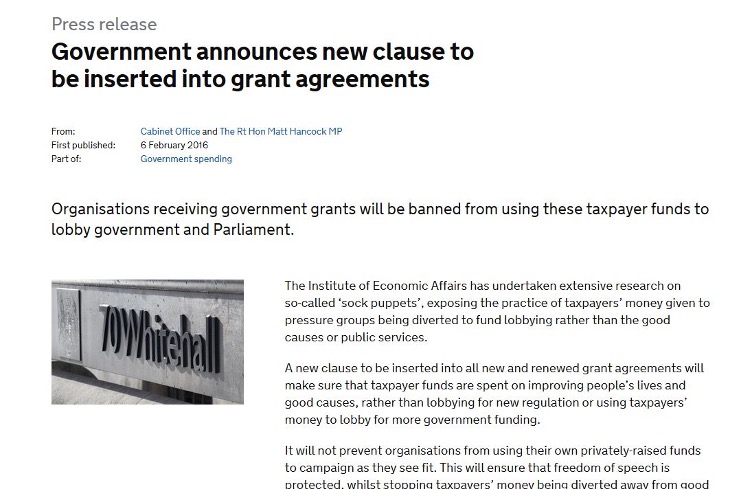
Government announcement of changes to government grant agreements for charities in February 2016. (gov.uk)4
Government Announces State-Funded Charities Will be Banned from Lobbying Government and Parliament
In February 2016, the Government announced that “Organisations receiving government grants will be banned from using these taxpayer funds to lobby government and Parliament”. The press release stated:
“A new clause to be inserted into all new and renewed grant agreements will make sure that taxpayer funds are spent on improving people’s lives and good causes, rather than lobbying for new regulation or using taxpayers’ money to lobby for more government funding”.4
The Government was again explicit where the idea had come from:
“The Institute of Economic Affairs has undertaken extensive research on so-called ‘sock puppets’, exposing the practice of taxpayers’ money given to pressure groups being diverted to fund lobbying rather than the good causes or public services.” 4
The fact that government policy has clearly been influenced by the IEA, which effectively acts as a front group for the tobacco industry, raises questions about the adequacy of the Government’s implementation of Article 5.3 of the Framework Convention on Tobacco Control.
IEA “Delighted” by News
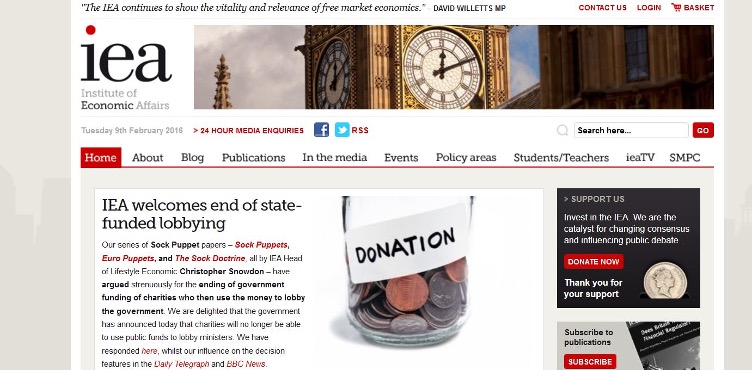
The IEA website “welcomes” ban on publicly-funded charities from lobbying government in February 2016. (iea.org.uk)10
The IEA responded by stating:
“We are delighted that today the government is making public sector funding conditional on it not being used for lobbying, which is profoundly undemocratic. Charities and NGOs that are dependent on government funding are not independent of government.”10
Replying to the announcement, Snowdon wrote “This is the best new I’ve heard in ages”.15
The UK£15,000 “Mystery” Donation
Days after the announcement by the Government, the Independent newspaper reported how the IEA “accepted [UK]£15,000 from an unnamed source to ‘develop’ its controversial proposals to prevent charities from using public grants to lobby ministers, civil servants or MPs”.6
The IEA refused to disclose who the money was donated from.
It later transpired that the Minister responsible for the decision, Matthew Hancock, had also accepted UK£22,000 in donations from the Chairman of the IEA.16
Demonising the Charity Sector
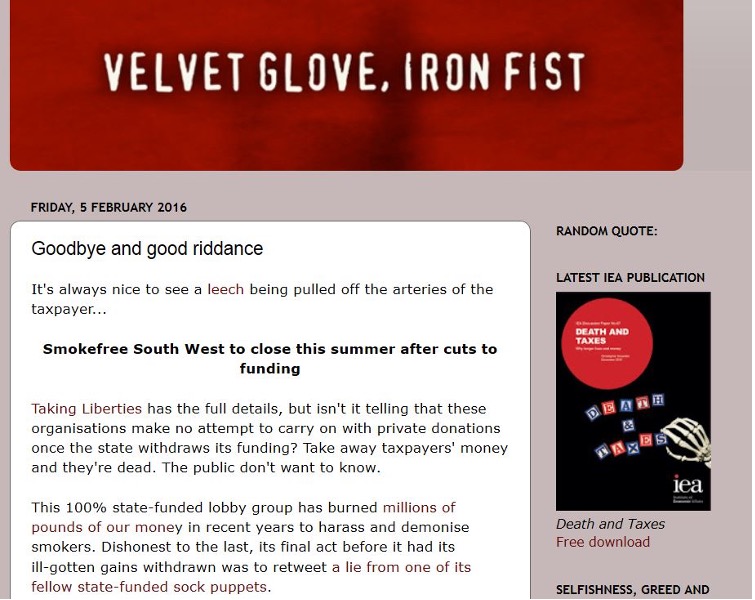
Snowdon attacking SmokeFree South West as a “leech” of taxpayer money on his blog, “Velvet Glove, Iron Fist”. (velvetgloveironfist.blogspot.com)17
Twisting the “Sock Puppet” Definition
The generally accepted definition of a “sock puppet” is a fake online identity. Indeed, the first report by the IEA on “sock puppets” even quoted the Wikipedia definition that a sock puppet is “a false identity assumed by a member of an internet community who spoke to, or about himself while pretending to be another person”. The IEA report added that “the average sock puppet uses pseudonyms to praise and endorse his own views”.7
The definition used by Snowdon and the IEA bears no resemblance to the activities of the charities profiled in the report, which do not have “false” online identities. It seems the tactic is simply to try and tarnish charities.
Attacking Charities as “Leeches” on the State
As part of the IEA campaign against charities, Snowdon has denigrated them as “leeches” that need to be “burnt” off the state.
In July 2015, DrinkWise North West, which worked in partnership with the public sector to reduce alcohol related harm, had its Government funding withdrawn and had to close.
Snowdon wrote:
“I’m pleased to able to bring glad tidings for a change. DrinkWise North West, the taxpayer-funded lobby group, has had its state-funding withdrawn. Since nobody in their right mind would give it money voluntarily, this naturally means that it has been closed down with immediate effect.”18
He went on to add:
“It is probably too much to hope that the rinky-dink governments of Scotland and Wales will stop throwing money at the likes of Alcohol Focus Scotland and Alcohol Concern, but England is certainly ready to save a few million quid by burning some leaches off the taxpayers’ skin. It can’t happen a day too soon.”18
In February 2016, Snowdon reacted to the news that the anti-smoking charity, SmokeFree South West, was to close, by claiming it was “always nice to see a leech being pulled off the arteries of the taxpayer”.17
He also denigrated it as a “parasitic organisation” and bunch of “bullies”.17
Charities Urge Government to Reconsider
The National Council for Voluntary Organisations (NCVO) attacked the proposals by writing to the Prime Minister with a letter signed by 158 representatives of charities. The letter said in part:
“We believe that a strong, effective working relationship between voluntary organisations and the state, based upon mutual respect and understanding, is beneficial to the people of this country and beyond. The ability of voluntary organisations to campaign, regardless of any financial relationship, is a defining characteristic of this relationship. Abandoning this protection is surely not the intended consequence of these proposals, as their impact runs contrary to the relationship you have sought to develop. As such, we urge you to reconsider them and work with the voluntary sector to find a constructive way forward.”19
The letter highlighted that charities working on issues as far ranging as counter-extremism and Female Genital Mutilation (FGM) would be affected.19
Confusion Over Whether the Rules were to Affect Universities Too
Prior to the Government climb-down, there was much confusion over how the new rules would affect university research.
Measure Will “Undermine Evidence, Policy and the Public Interest”
Academic researchers have also pointed out how the proposed measure could undermine publicly-funded academic research. Writing in The Guardian, two academics noted how the measure “flies in the face of concerted encouragement by government over the past decade for researchers to engage more actively with policy”.20
They pointed out that an analysis of the near-7,000 impact case studies submitted to the 2014 Research in Excellence Framework (REF) by 154 universities, found that “informing government policy” was the most common type of impact, followed by “supporting Parliamentary scrutiny” and “technology commercialization”.20
Similarly, they highlighted how “the Russell Group found that fifty-five per cent of all the REF case studies submitted by its member universities had an impact on policy”.20
They concluded:
“So, taken at face value, the new clause has the potential to halt the onward march of impact, by outlawing the use of publicly-funded research and evidence to inform government policymaking.”20
Scientists are “Baffled” by Announcement
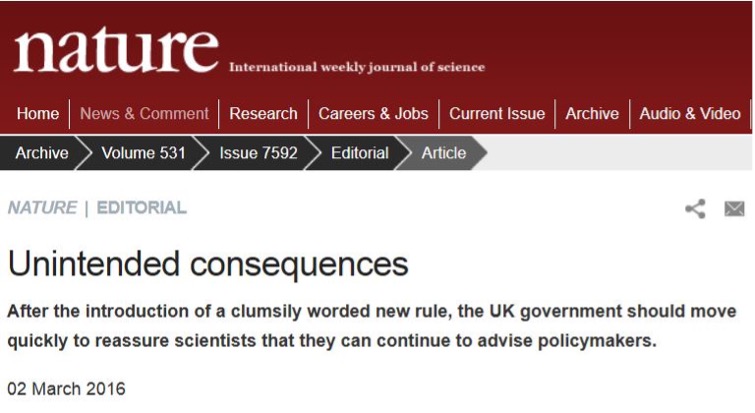
An editorial in Nature criticised the change to UK government policy. (Nature)21
In March 2016, the prestigious scientific journal Nature weighed into the debate about whether Universities would be gagged by the proposals, saying in a strongly-worded Editorial:
“Scientists in the United Kingdom could be forgiven for feeling baffled by the development, given that the government-funded research councils have spent recent years promoting the ‘impact agenda’. This encourages scientists to make sure that their work has reach outside their own academic disciplines, including influencing policy and legislation. There must be a complete exemption of any research from this clause, not just for those who work in academia, but for those who work directly for government.”21
Government Clarifies Clause in Regard to Universities
The following month, on 19 April 2016, the Government announced that University funding would be exempted from the clause. Responding to a statement in the House of Lords on the clause, the Universities and Science Minister, Jo Johnson MP, said:
“I am happy to confirm that it is not our intention for the Research Councils, the Higher Education Funding Council for England (HEFCE) or the National Academies to be covered by the clause. We are continuing to talk to the research community and will outline more detail by 1 May, when this clause takes effect.” 22
“Outrage” at Charity Commission’s Involvement with the IEA
Documents released under FOI suggest that the Charity Commission were “complicit” with Christopher Snowdon and the Institute of Economic Affairs on “political campaigning” by charities.
In May 2013, Gwythian Prins, a Research Professor at the London School of Economics and Political Science and Visiting Professor at the University of Buckingham, who was just about to become a non-executive Director of the Charity Commission, wrote an email to Snowdon, under the heading: “Political campaigning”:
“The Chairman of the Charity Commission, upon whose Board I shall shortly start to serve, has asked me to talk to you about matters of mutual interest. I shall be happy to do so. I am working at home today and in London tomorrow and Thursday; or at a later time of convenience. This issue is no flash in the pan”.
To this Snowdon replied:
“Thanks for getting in touch. I’d love to discuss this matter with you. Are you free to take a call in the next hour or so?”
Five months later, in October 2013, Snowdon wrote to Prins again:
“We spoke a few months ago about the issue of state-funded charities lobbying the government. I’m in the process of writing about this subject again for the IEA, with a particular focus on what can or should be done. I wonder if you are free to talk about this sometime before the end of the month? I don’t live in London but I go there regularly and can meet you for a coffee, drink or a meal wherever’s convenient.”
Once again, Prins said he would be “glad to meet”.
The following month, on 15 November 2013, Snowdon wrote again:
“I hope you’ve achieved – or are close to achieving – your deadline! I’m close to achieving my own deadline which is to submit another paper to the Institute of Economic Affairs about state-funded activist groups. I attach some of my conclusions and recommendations (in confidence) which are by no means final. It would be great to meet up in London when you are free to discuss this issue. To put it concisely, I think there are some things the Charity Commission could do but I think most of the responsibility lies with the government. If you think the Commission could do more, I would genuinely love to hear your suggestions.”
Prins replied:
“I will read you material with interest and shall of course keep tight. I could meet on the morning of 25th November in London: I suggest at my Club {REDACTED} for coffee? I am then going to Amsterdam. If that is not convenient, we’ll find another time?”
The two met in London on 16 December 2013.
In February 2014, Snowdon wrote again:
“I hope you’re well. Please find attached the new IEA report on state-funded activism which will be released tomorrow (embargoed until midnight).”
Prins replied:
“IS IT POSSIBLE to have a printed copy of your new report?”
To which Snowdon responded:
“Sure. We’re getting the print editions next week. I’ll make sure a few copies are posted to you.”23
“Shocked” by these Revelations
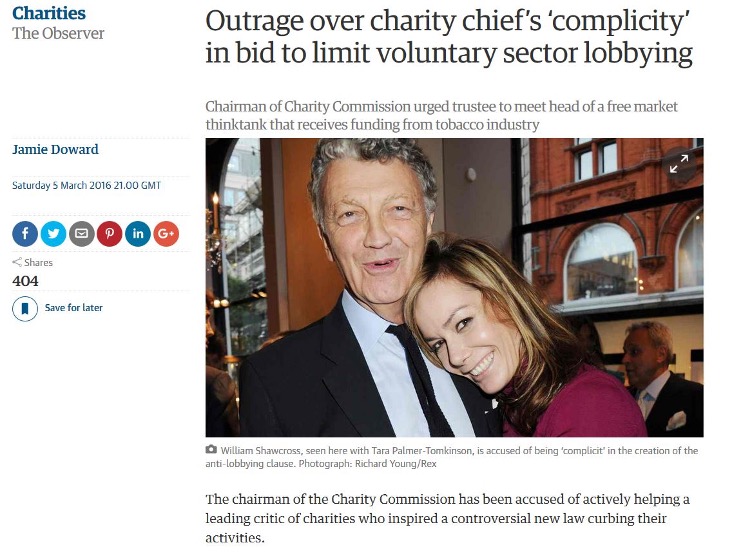
The Observer reported on the Charities Commission’s involvement with IEA.(The Observer)24
When The Observer covered this story in March 2016, Sir Stephen Bubb, chief executive of the Association of Chief Executives of Voluntary Organisations, urged both Prins and the chair of the Charity Commission, William Shawcross to clarify their roles in the IEA’s research “or risk having trust in the commission irreparably damaged”.24
He added that “Charity leaders, workers and volunteers will be shocked and alarmed by these revelations”.24
Charity Commission Was “Not Involved”
In response to the Observer story, a spokesman for the Charity Commission said:
“To be clear the Charity Commission did not call for, and was not consulted upon, the policy announced by the government on 6 February 2016, nor was it involved in its development. The Commission regularly meets with charities and those involved with the sector, for example the NCVO. This is a vital part of to being a modern, effective, outward looking regulator. The meeting in question was part of the Commission’s process of keeping abreast of discussion and events in the sector.”25
Government “Pauses” Implementation
On 27 April 2016, after months of pressure, the Government announced that:
“We are pausing the implementation pending a review of the representations made and we will take a decision on the form of the clause following this review.” 26
In response, the NCVO and other organisations opposed to the clause issued a statement:
“We continue to call for the full and immediate withdrawal of this policy. The clause, as it stands, goes much further than it says on the tin and will deter many charities and social enterprises from making representations to government and parliament. We look forward to hearing more from government on how they will proceed – in particular, we have asked them to consider a formal consultation with the charity sector and other affected bodies.”27
They added:
“We also require urgent clarification of how this pause will apply to those organisations that already have grant agreements containing the anti-lobbying clause.”27
Government “Climb-Down”
In December 2016, in a significant climb-down, the UK Government announced a new set of grant standards for charities. According to the Government, it had
“engaged key partners in the academic and research communities to inform the development of the new standards. This will be implemented on a recommended best practice basis with the flexibility to ensure that research and innovation grants are not adversely affected. The standards are consistent with the current best practice and will continue to be implemented in a proportionate way.28
It continued:
“In the case of research grants, academic autonomy is critical to the strength of science and research. Furthermore, informing policy and public debate is an integral part of the research process. The new approach includes clear guidance for research grant managers that activities such as responding to select committees and consultations are appropriate for inclusion in their research grant terms.”28
According to The Guardian, the “Climbdown follows criticism from charities and scientists, who feared experts would be stopped from advising MPs and ministers”. The paper added: “Charities see the latest move as the official demise of a policy that was already in tatters”.29
Bob Ward, the Policy and Communications Director at the Grantham Research Institute on Climate Change and the Environment at the London School of Economics and Political Science then called for an inquiry into how the IEA had persuaded the government to propose the anti-lobbying clause in the first place.
He told The Guardian:
“I am glad that the research community has petitioned and overturned the wrong-headed regulations. There should now be an inquiry into why the Cabinet Office drafted such poor regulations in response to a campaign by a group of free market fundamentalists who keep their sources of funding secret and whose research is nothing more than propaganda for their extreme ideological agenda.”29
Relevant TobaccoTactics Resources
- Institute of Economic Affairs
- Third Party Techniques
- IEA: History of Close Ties with the Tobacco Industry
- IEA: Working with RJ Reynolds, BAT and Philip Morris on Environmental Risk
- Mark Littlewood, Director of the IEA
- Letter to the Editor of The Telegraph newspaper